Answer these simple questions and we will find you the BEST prices
Which type of solar quotes do you need?
It only takes 30 seconds
100% free with no obligation

Get up to 4 quotes by filling in only 1 quick form

Slash your energy bills by installing solar panels

For the average 2-3 bedroom house
- GreenMatch
- Solar Energy
- Solar Panels
- Garden Solar Panels
Garden Solar Panels: Costs, Pros & Cons (October 2025)

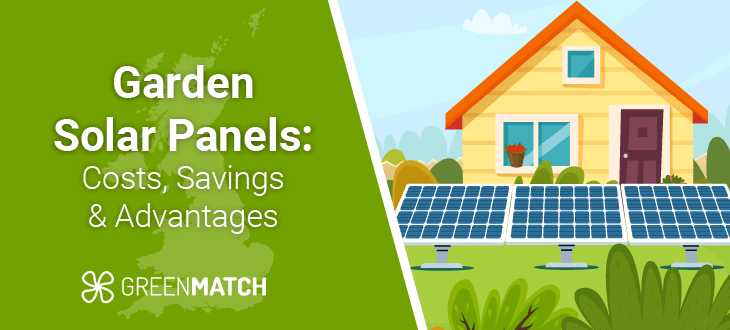
- Garden solar panels function like traditional solar panels but are ground-mounted instead of roof-mounted and placed in your garden.
- They are typically more expensive than regular solar panels, costing approximately £11,700 for a 4kW system, but can help you save £1,304 annually on electricity costs.
- The primary benefit of garden solar panels is their suitability for homes with roofs that are not ideal for solar panel installation, enabling homeowners with such roofs to enjoy the advantages of solar energy.
In the realm of renewable energy solutions, garden solar panels have become a versatile and innovative choice for UK homeowners for whom traditional roof-mounted solar panels are not feasible. These solar panels, differing from conventional roof-mounted systems, present a distinctive method of leveraging solar energy through ground installation in gardens.
This article will delve into the different types, benefits, costs, and suitability of garden solar panels in the UK. We'll shed some light on their potential for homes with unsuitable roofs that haven’t been able to enjoy the perks of solar energy or simply for aesthetic reasons.
To be sure that solar panels for gardens are worth it for your home, it's important to have your home and its surroundings properly assessed.
Here at GreenMatch, we offer a free service that allows you to compare quotes from up to 4 local installers, enabling you to explore solutions at your own pace instead of doing all the hard work yourself. Click below to fill out our 30-second form and take the first step towards a more efficient and eco-friendly energy solution for your home today.
- Quotes from local engineers
- Payment by finance available
- Save up to £1,567 per year
It only takes 30 seconds



Can I put solar panels in my garden in the UK?
Yes, you can certainly put solar panels in your garden in the UK. However, several factors should be taken into account first. One of the most important considerations is whether or not you will need planning permission for your garden solar panels. While it’s not necessary for most domestic installations, it is crucial to seek approval from the local council if your property is listed or located in a conservation area.
Therefore, you might still be wondering, can I put solar panels in my garden in the UK? Well, the short answer is yes. However, it’s important to note that to install solar panels in your garden a licence will not be required if the system’s total area doesn’t exceed 9m².
Compliance with regulations regarding panel placement, ensuring they are at a suitable distance from boundaries to avoid disturbances to neighbours or encroachment, is vital. Different rules apply when installing panels on owned land like gardens or fields. The initial standalone solar panel system setup is typically permitted, but additional units require planning permission to adhere to guidelines.
Moreover, for tenants in rental properties, obtaining consent from the landlord is essential. Another key factor is the available garden space and the extent to which you are willing to dedicate it to the solar panels you’re thinking of installing.
How should a garden solar panel be positioned?
Maximising the benefits of British sunshine can be quite challenging. However, new monocrystalline solar panels are effective enough with plain daylight. As a result, sunlight is not as important as it once was.
Nevertheless, ensuring the correct positioning of garden solar panels remains crucial. To optimise energy production, garden solar panels should be strategically placed and oriented to receive the maximum amount of sunlight.
For ground mounted solar panels installed in the garden, the ideal orientation is facing south, with an angle ranging from 30 to 40 degrees. This setup ensures that the panels capture the most direct sunlight throughout the day, particularly during the summer months when the sun is at its peak.
It's important to note that shading from nearby structures or vegetation can impact the optimal orientation and angle, as well as overall solar panel efficiency. Therefore, it is highly recommended to consult with a solar professional who will conduct a site assessment to determine the best configuration for your garden, ensuring you get the most out of your solar investment.
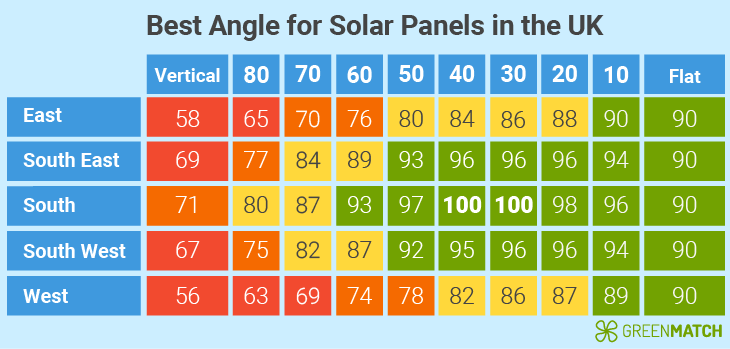
Types of garden solar panels
The most common types of solar panels as we know them are roof-mounted solar panels. However, many households are not ideal for this type of installation for various reasons, such as insufficient roof space or the stability of their roof. As a result, garden solar panels are an alternative for those still seeking the advantages of solar energy.
There are different garden solar panels: ground-mounted solar panels, solar panels on your garden roof and portable solar panels. These types will be explained in further detail for a better understanding.
Ground mounted solar panels
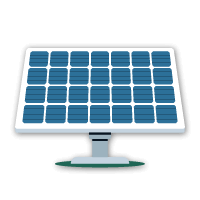
Ground-mounted solar panels, also known as standalone solar panels, differ from roof-mounted panels as they are fixed into the ground using a metal frame or pole. They require about 2m² per panel and should be placed at least 5m away from the house to avoid shading.
A garden of 15-20m² can accommodate 1-3 panels, while powering a 3-bedroom house may require around 10 panels in a 50m² garden. These panels offer flexibility, increased energy production potential, and easier maintenance access compared to roof-mounted systems, making them a versatile and efficient option for solar energy generation.
Solar panels on your shed/garden roof
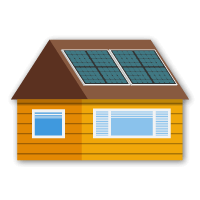
On the other hand, solar panels installed on garden roofs or sheds offer an efficient use of available space and are also well worth considering. These panels are mounted directly on the roof structure, similar to traditional roof-mounted panels but in a garden setting.
To ensure the effectiveness of solar panels for sheds, certain considerations need to be addressed. First of all, the shed must be constructed from sturdy materials capable of supporting the weight of the panels. Factors such as the shed roof material and size play a crucial role in determining suitability for solar panel installation.
Wooden sheds typically support up to 6-7 kg, metal sheds around 12 kg, and plastic sheds have limited weight capacity. Standard solar panels, weighing about 18-20kg, may exceed the weight capacity of some sheds and potentially become a risk. Flexible solar panels, weighing 2-6kg, offer a lighter alternative for sheds with weight limitations.
Portable solar panels
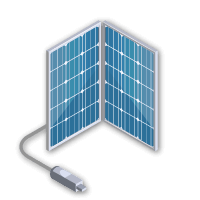
Portable solar panels offer a different approach, providing mobility and versatility. These panels can be easily moved around the garden or even taken with you on trips, making them suitable for powering various smaller electric appliances, such as your phone, laptop or even fans.
While commonly used for outdoor activities such as camping, they can also be set up in gardens. These panels are smaller than standard ones, typically ranging from 100 to 200 watts. To operate electric appliances safely, portable solar panels are often used with a solar generator, which includes a solar inverter, charge controller, and solar battery. Solar generators are available as part of solar panel kits or separately for customised setups.
How much do garden solar panels cost?
The average garden solar panel cost for a 2-3 bedroom house will range from £9,759 to £16,900. As with more traditional roof-mounted solar panels, their cost will vary depending on the size of your home, your energy needs and the system size required.
For a better understanding of these costs, in the table below you can see an overview of the different costs of garden solar panels per system size:
| House size | Number of solar panels (450W) | Cost (including installation) | Required garden space |
|---|---|---|---|
| 2 bedroom house | 6 | £9,759 | 12m² |
| 3 bedroom house | 10 | £11,700 | 20m² |
| 4 bedroom house | 14 | £15,600 | 26m² |
| 5 bedroom house | 16 | £16,900 | 30m² |
These costs are estimates. Get a local installer QUOTE now!
The cost of solar panels for your garden shown above is a mere estimate. It is always highly recommended that you consult a professional solar panel installer who can assess your particular situation and offer cheap solar panels if need be.
That being said, garden solar panels are usually more expensive than roof-mounted solar panels due to their more time-consuming installation process, which involves excavation of the ground and connecting wires to your house.
However, if the high initial costs are your main concern and the last thing stopping you from enjoying the versatility and long-term savings of garden solar panels, there are numerous solar panel grants available in the UK that can help offset these expenses, such as the ECO4 scheme, 0% VAT scheme, and the Smart Export Guarantee (SEG) program.
Already have an idea of what you’re looking for and don’t want to waste any more time? Simply click the button below to get up to 4 of the best solar panel quotes. It’s completely free and you’re under no obligation to accept any of the quotes you receive.
- Quotes from local engineers
- Payment by finance available
- Save up to £1,567 per year
It only takes 30 seconds



How much can you save by installing solar panels for gardens?
Homeowners who choose garden solar panels can benefit from their versatility in terms of placement, regardless of their roof's suitability. Moreover, they can also expect significant savings on their electricity bills by generating their own solar power.
For example, a 4kW solar system installed in a garden can save around £1,304 annually, which translates to approximately £16,500 in savings over 25 years. These substantial savings make garden solar panels an attractive option for UK homeowners looking to reduce their energy costs and embrace renewable energy.
| House size | Solar system size | Annual savings | Savings after 25 years | Break-even point (years) |
|---|---|---|---|---|
| 1-2 bedrooms | 3kW | £783 | £19,578 | 7 |
| 2-3 bedrooms | 4kW | £1,304 | £32,608 | 6 |
| 4-5 bedrooms | 6kW | £1,567 | £39,163 | 6 |
Use our solar panel calculator to determine how much you can save on solar panels based on your average electricity bill.
The amount you can save by installing solar panels for gardens varies depending on factors such as the size of the solar panels, your energy consumption, local sunlight conditions, and any available incentives or grants.
Additionally, with the potential to earn money through the Smart Export Guarantee (SEG) program by selling excess electricity back to the grid, the savings can further increase over time. It's recommended to consult with a professional solar panel installer to assess your specific situation and provide a more accurate estimate of potential savings based on your circumstances.
What are the pros and cons of garden solar panels?
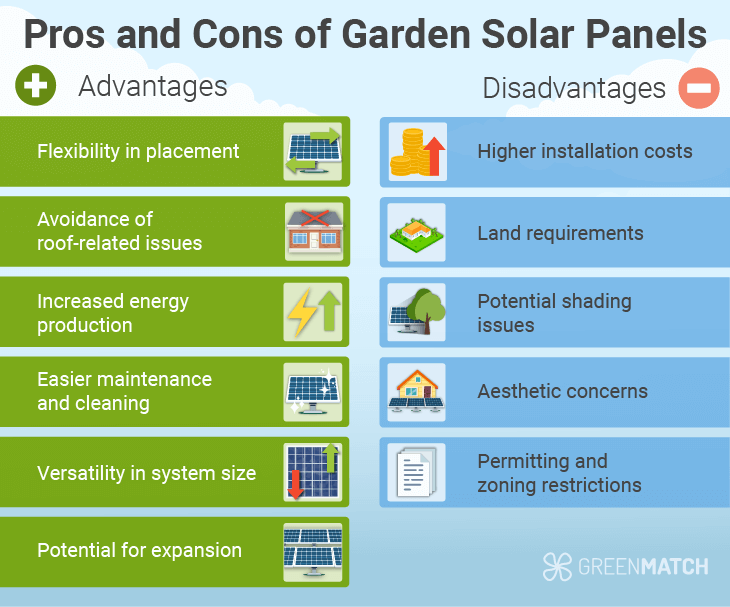
Compared to roof-mounted panels, garden solar panels offer advantages like optimal positioning for sunlight exposure and avoidance of roof issues. While they may have higher costs and land requirements, garden solar panels provide a viable solution for homeowners seeking solar energy without roof limitations.
We’ve summarised the most important pros of garden solar panels:
- Flexibility in placement: Garden solar panels can be positioned in optimal locations to maximise sunlight exposure, unlike roof-mounted panels which are limited by the orientation and angle of the roof.
- Avoidance of roof-related issues: Garden solar panels eliminate concerns related to roof structure or compatibility, which can be a limiting factor for roof-mounted installations.
- Increased energy production: With the ability to adjust the angle and orientation, garden solar panels can potentially generate more electricity compared to fixed roof-mounted systems.
- Easier maintenance and cleaning: Ground-mounted garden solar panels are more accessible for maintenance, cleaning, and repairs, ensuring optimal performance over time.
- Versatility in system size: Garden solar panels offer more flexibility in terms of system size, as they are not constrained by the available roof space.
- Potential for expansion: Garden solar panel systems can be expanded more easily than roof-mounted systems, allowing homeowners to increase their solar capacity as their energy needs grow.
The primary advantage of garden solar panels is their incredible flexibility. However, while garden solar panels offer several advantages, they also have some potential disadvantages compared to roof-mounted solar panels:
- Higher installation costs: Garden solar panel installations typically require more labour, materials, and equipment, resulting in higher upfront costs compared to roof-mounted systems.
- Land requirements: Garden solar panels require dedicated space on the ground, which may not be feasible for properties with limited land or yard space.
- Potential shading issues: Nearby trees, buildings, or other structures can cast shadows on ground-mounted panels, reducing their efficiency and energy production.
- Aesthetic concerns: Some homeowners may find ground-mounted solar panels less visually appealing than roof-mounted systems, which can be less noticeable from the ground level.
- Permitting and zoning restrictions: Some local regulations or homeowners' associations may have restrictions or requirements for ground-mounted solar panel installations, which could add complexity to the process.
It's important to carefully evaluate these potential disadvantages alongside the advantages to determine what the best solar panels for your specific needs and circumstances are.
What are the best solar panels for gardens?
When choosing solar panels for gardens, similar considerations to roof-mounted systems should be made, such as solar panel efficiency, optimal performance, and meeting specific criteria.
For a garden to be suitable, it should receive at least 4 hours of direct sunlight per day, as shaded areas may not be ideal. Sufficient space is crucial, especially for large, ground-mounted systems like those required for a 3-bedroom house, typically needing at least 50 m² of space. Ground-mounted setups larger than 9m² also require planning permission, and additional regulations may apply if you live in a conservation area.
In regards to the best solar panels for gardens, consider monocrystalline panels for their high efficiency and portable panels for flexibility and convenience. For a more precise assessment of your garden's suitability and the most appropriate solar panel setup, it is recommended to consult with a professional solar panel installer. They can evaluate your specific situation and provide tailored advice. Here’s where we can help.
Instead of spending hours of your time doing endless research by yourself, GreenMatch offers a great shortcut by connecting you with up to 4 installers from our vetted network of professionals for free and without any obligation to accept any offer. Click the button below to begin. It takes less than a minute!
- Quotes from local engineers
- Payment by finance available
- Save up to £1,567 per year
It only takes 30 seconds



FAQ
Yes, ground-mounted solar panels can be placed in your garden or farm, provided they have enough space available.
Only if your solar panels exceed 9m² they will require planning permission. Additional regulations may apply if you live in a conservation area.
Solar batteries have a lifespan of approximately 5 – 7.5 years for lead-acid and 11-15 years for lithium-ion batteries. However, their lifespan will depend on factors such as being over-discharged or being exposed to extreme weather.

Alejandro is a copywriter at GreenMatch and is passionate about European environmental policy and renewable energy. He has conducted research on the European Green Deal’s impact on EU energy policy and climate adaptation, and he is committed to using his writing skills to promote sustainable policies.
We strive to connect our customers with the right product and supplier. Would you like to be part of GreenMatch?

- Garden Solar Panels: Costs, Savings & Advantages in 2026
- Can I put solar panels in my garden in the UK?
- How should a garden solar panel be positioned?
- Types of garden solar panels
- How much do garden solar panels cost?
- What are the pros and cons of garden solar panels?
- What are the best solar panels for gardens?
- FAQ
